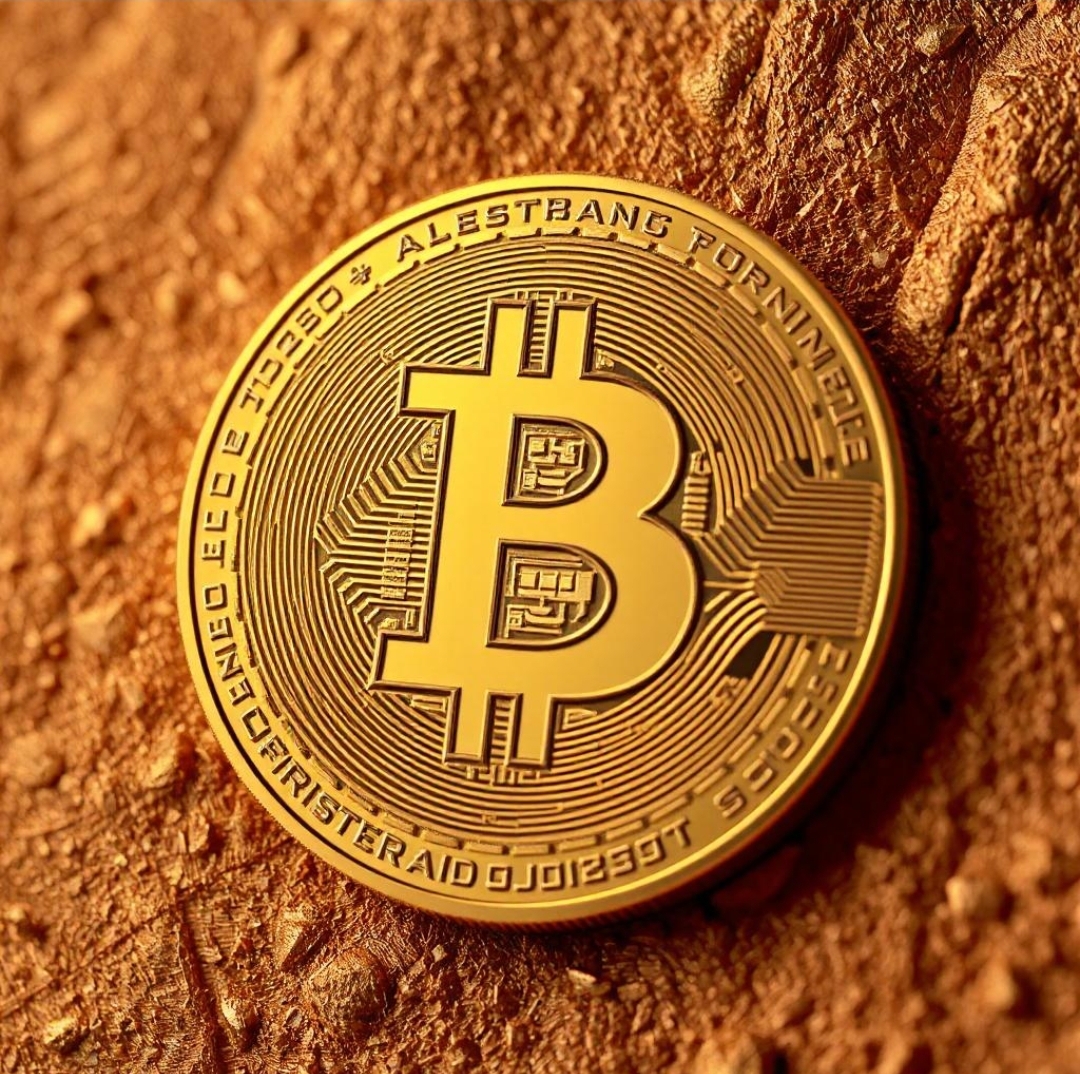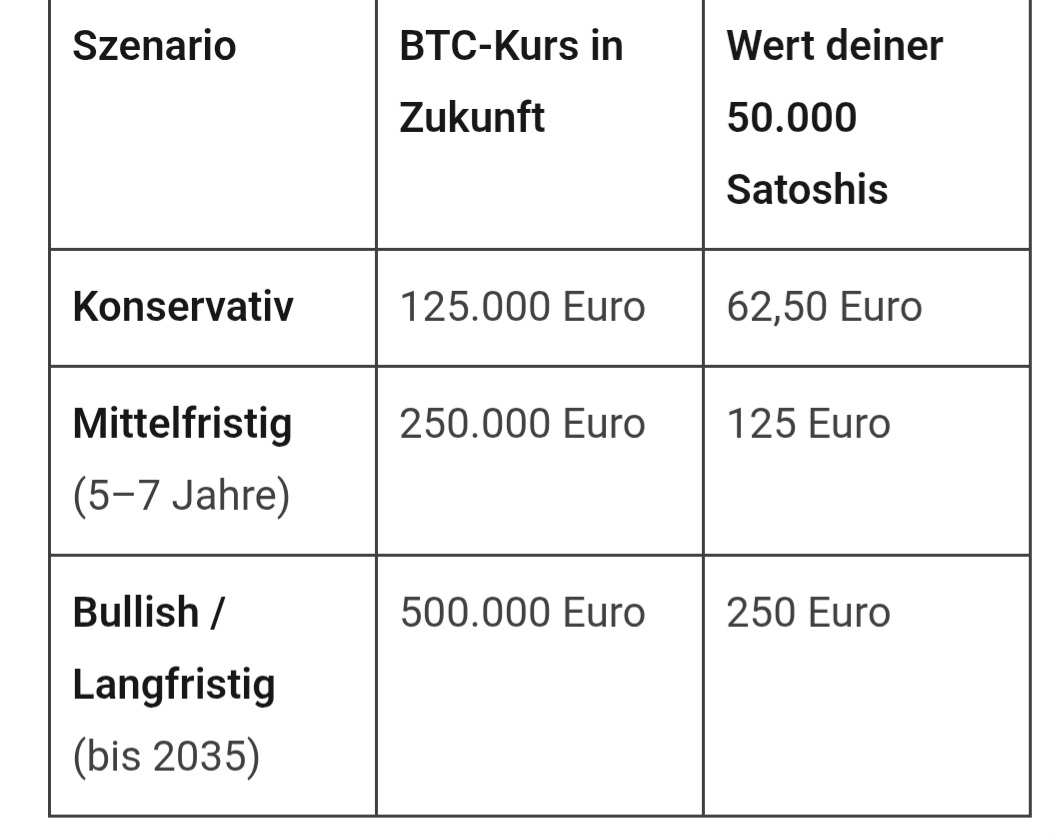Lohnt es sich 50.000 Satoshis zu kaufen?/Is it worth buying 50,000 Satoshis?

„Bitcoin und Kryptowährungen sind doch nur Internet-Betrug!“
Haben Sie diesen Satz schon einmal gehört? Wenn ja, ist das nicht überraschend. In der breiten Bevölkerung ist das Misstrauen gegenüber digitalen Assets immer noch groß. Und das ist kein Wunder. Schließlich wurden Bitcoin und Co. lange Zeit selbst von hochrangigen Politikern und Finanzprominenten beargwöhnt.
US-Präsident Donald Trump etwa sagte einmal: *
„Bitcoin sieht aus wie ein großer Betrug“ und ein andermal: „Ich mag Bitcoin und Kryptowährungen nicht. Das ist kein Geld, sondern nur hochvolatil und basiert auf heißer Luft!“*
Larry Fink, Geschäftsführer des weltgrößten Vermögensverwalters BlackRock, sagte 2017, dass der Kryptomarkt nur eine Spielwiese für kriminelle Machenschaften sei.
War es schlau, sich an diese Unkenrufe zu halten? Die Antwort lautet: Nein. Ganz und gar nicht. Wer Bitcoin wegen Trumps und Finks Zweifeln links liegen gelassen hat, verpasste den steilsten Aufstieg einer Anlageklasse seit es Börsen gibt.
Das hat auch seine größten Zweifler überzeugt. Larry Fink räumte kürzlich ein, er habe sich bei Bitcoin geirrt und bezeichnete BTC als „digitales Gold“. Donald Trump machte mit Bitcoin-Versprechen Wahlkampf und rief der Menge zu: „Verkauft niemals eure Bitcoins!“
Was macht Bitcoin wertvoll?
Bitcoin ist deshalb so wertvoll, weil es im Gegensatz zu unserem normalen Geld eine begrenzte Menge davon gibt: Maximal 21 Millionen Stück. Während Zentralbanken in Krisenzeiten neues Geld drucken – was Inflation auslöst und die Kaufkraft der Verbraucher durch steigende Preise schwächt – bleibt Bitcoin knapp wie digitales Gold. Diese künstliche Verknappung macht ihn zu einem sogenannten harten Asset. Gerade in Zeiten wachsender Staatsverschuldung und expansiver Geldpolitik wird Bitcoin für viele Menschen zur Absicherung gegen Währungsabwertung.
In geopolitisch instabilen Regionen, etwa bei Sanktionen oder politischer Unterdrückung, bietet Bitcoin eine neutrale, offene Infrastruktur zum Speichern und Senden von Vermögen. Das macht ihn besonders relevant für Menschen, die keinen Zugang zu einem stabilen Bankensystem haben – oder denen dieser Zugang plötzlich entzogen wird.
Russland etwa nutzt Kryptowährungen bereits fallweise für Rohstoff-Deals mit anderen Staaten, um die Dominanz des US-Dollars zu schwächen. In den USA hat Donald Trump per Exekutivbefehl im März eine strategische Bitcoin-Reserve eingerichtet, die perspektivisch ähnliche Sicherheit bieten soll wie die staatlichen Goldbestände.
Bitcoin ist an der Börse deshalb so erfolgreich, weil er durch die Einführung regulierter ETFs (Exchange Traded Funds) für institutionelle Anleger und den breiten Markt zugänglich wurde. Diese ETFs – etwa von BlackRock, Fidelity oder Grayscale – ermöglichen Investitionen in Bitcoin, ohne dass Anleger selbst ihre Konten auf der Blockchain verwalten müssen.
Die Adaptionskurve steigt also steil an, der Preis ist seit 2022 von 15 000 auf mehr als 100 000 US-Dollar pro Bitcoin angestiegen. Lohnt es sich jetzt noch, einzusteigen?
Lohnt es sich, 50 Euro in Bitcoin zu investieren?
Auch ein kleiner Betrag von 50 Euro hilft dabei, erste Schritte in der Krypto‑Welt zu machen und ein Gefühl für den Umgang mit digitalem Geld zu entwickeln. Zudem ist es ein niederschwelliger Einstieg ins Investieren in eine alternative Anlageklasse wie Kryptowährungen.
Selbst kleine Investitionen ermöglichen einen ersten Zugang zu Bitcoin, wenn man Gebühren, Volatilität und Rendite berücksichtigt. Wer früh einsteigt, verschafft sich nicht nur potenzielle Renditechancen, sondern auch ein tieferes Verständnis für die Zukunft digitaler Finanzsysteme.
Rechenbeispiele: Was könnte dein Bitcoin-Anteil in Zukunft wert sein?

Ich zitierte aus folgenden Artikeln...
https://hkcmanagement.de/hkcmnews/lohnt-es-sich-50-euro-in-bitcoin-zu-investieren
https://www.btc-echo.de/news/50-euro-bitcoin-kaufen-wissen-212494/
Mein persönliches Fazit:
Auch wenn sich der Zyklus dem Ende nähert kann es sich lohnen schon heute damit zu beschäftigen. Keine Kryptowährungen zu kaufen ist wohl auch nicht intelligenter als ein Fiatgeld Maximalist zu bleiben?
English

"Bitcoin and cryptocurrencies are just internet fraud!"
Have you ever heard this phrase? If so, it's not surprising. Distrust of digital assets remains high among the general public. And that's no wonder. After all, Bitcoin and other cryptocurrencies were long viewed with suspicion even by high-ranking politicians and financial celebrities.
US President Donald Trump, for example, once said: *
"Bitcoin looks like a big scam" and another time: "I don't like Bitcoin or cryptocurrencies. It's not money, it's just highly volatile and based on hot air!"*
Larry Fink, CEO of the world's largest asset manager, BlackRock, said in 2017 that the crypto market was just a playground for criminals.
Was it wise to heed these dire predictions? The answer is: No. Not at all. Anyone who ignored Bitcoin because of Trump and Fink's doubts missed the steepest rise of any asset class since the advent of stock exchanges.
This has convinced even his biggest doubters. Larry Fink recently admitted he was wrong about Bitcoin and called BTC "digital gold." Donald Trump campaigned on Bitcoin promises and shouted to the crowd: "Never sell your Bitcoins!"
What makes Bitcoin valuable?
Bitcoin is so valuable because, unlike regular money, there is a limited supply: a maximum of 21 million coins. While central banks print new money in times of crisis – which triggers inflation and weakens consumer purchasing power through rising prices – Bitcoin remains scarce, like digital gold. This artificial scarcity makes it a so-called hard asset. Especially in times of growing national debt and expansionary monetary policy, Bitcoin becomes a hedge against currency devaluation for many people.
In geopolitically unstable regions, such as those subject to sanctions or political repression, Bitcoin offers a neutral, open infrastructure for storing and sending assets. This makes it particularly relevant for people who lack access to a stable banking system – or whose access is suddenly withdrawn.
Russia, for example, is already occasionally using cryptocurrencies for commodity deals with other countries to weaken the dominance of the US dollar. In the US, Donald Trump established a strategic Bitcoin reserve by executive order in March, which is intended to offer similar security to government gold reserves.
Bitcoin's success on the stock market is due to the introduction of regulated ETFs (Exchange Traded Funds) that have made it accessible to institutional investors and the general market. These ETFs – such as those from BlackRock, Fidelity, or Grayscale – enable investors to invest in Bitcoin without having to manage their own accounts on the blockchain.
The adoption curve is therefore rising steeply, with the price having risen from $15,000 to more than $100,000 per Bitcoin since 2022. Is it still worth getting involved now?
Is it worth investing €50 in Bitcoin?
Even a small amount of €50 helps you take your first steps in the crypto world and develop a feel for handling digital money. It also provides a low-threshold entry point into investing in an alternative asset class such as cryptocurrencies.
Even small investments provide initial exposure to Bitcoin, considering fees, volatility, and returns. Those who get in early not only gain potential return opportunities but also a deeper understanding of the future of digital financial systems.
Calculation examples: What could your Bitcoin holdings be worth in the future?

I quoted from the following articles...
https://hkcmanagement.de/hkcmnews/lohnt-es-sich-50-euro-in-bitcoin-zu-investieren
https://www.btc-echo.de/news/50-euro-bitcoin-kaufen-wissen-212494/
My personal conclusion:
Even if the cycle is nearing its end, it may be worth getting involved today. Not buying cryptocurrencies is probably no smarter than remaining a fiat maximalist?
Posted Using INLEO
Mit 50.000 Sats anfangen ist keine schlechte Idee aber es sollte dann doch etwas mehr sein wenn man an Bitcoins Zukunft glaubt.
Meine erste Investition war damals 2017 für 10 € es müsste auch so 50.000 Satoshi gewesen sein 😉
Einen Sparplan mit den 50k jeden Monat, dann passt das schon.
Da hast du recht.
If you can efficiently buy 50k sats, it's actually a great idea. Start small.
Hallo, hallo, hallo, nix mit Zyklus Ende jetzt schon, bei BTC wäre es mir ja egal aber die ganzen Shitcoins müssen noch einmal pumpen, dann erst ist mein persönlicher Zyklus mit dem Zeugs endgültig beendet. 😉
So bullish finde ich 500k bis 2035 gar nicht, meine Glaskugel sieht ihn da bei einer Mio.
!BBH
Der Zyklus bei Bitcoin ist wahrscheinlich im Dezember zu Ende und der altcoin Zyklus Mitte Januar. Ich denke tun Ende des jahres wird es noch ein Mal richtig verrückt.
Hoffentlich
In cryptocurrencies in general, you have to get involved and when you have the opportunity, buy little by little so that your investments can continue to grow.
https://x.com/lee19389/status/1953949675025051871
#hive #posh
The smartest decision we can make is to buy cryptocurrencies to ensure a better future.
It's never too late to start investing in cryptocurrencies, even if it's just a small one, but you have to give it a chance, while as the days go by we'll realize that it was the best possible decision.
It has taken people time to understand this. Those who understood it in the beginning, today when they dig up their wallets containing Bitcoin, they are very happy that they gave importance to it and considered it a reality. Today, the whole world is accepting it.
And now everyone is just trying to gather as many sats as possible, you're right. DCAing into BTC in 2017 at $15k or $17k felt really expensive, and now what? Not many people will be wholecoiners in the future, so I wonder what people holding at least 0.1BTC will be called? 10percenters? Satoshillionaires?
Reich machen einen 50k Sats relativ sicher nicht. Aber es ist sicher ein guter Anfang! :)
Ja es geht nur um den Anfang, sich auch danach mit Kryptowährungen zu beschäftigen.
Ich denke die größte anfangs Hürde ist das registrieren auf einer Kryptobörse und dann das erste Fiatgeld zu investieren.
!WINE
https://www.reddit.com/r/Kryptostrassenwetten/comments/1mlnhtl/lohnt_es_sich_50000_satoshis_zu_kaufen/
This post has been shared on Reddit by @wissenskrieger through the HivePosh initiative.
I think this makes a lot of sense. People have doubted Bitcoin for years, but it’s still here and growing. The fact that it’s limited in supply is a big reason why it holds value, and it could be a good way to protect against inflation. Even starting small, like with €50, can be a smart move, not just for the investment, but to learn more about how digital finance works.
Yeah I think investing in cryptocurrencies is still a good thing to do in these days
Those people who says bitcoin and cryptocurrencies are just internet fraud don't have enough knowledge regarding it
I think it's still a great idea to purchase sats as fiat currencies will continue to be devalued. Understanding the future of finance will be a good addition and from there one can develop financial literacy and expand into the broader digital financial system :)